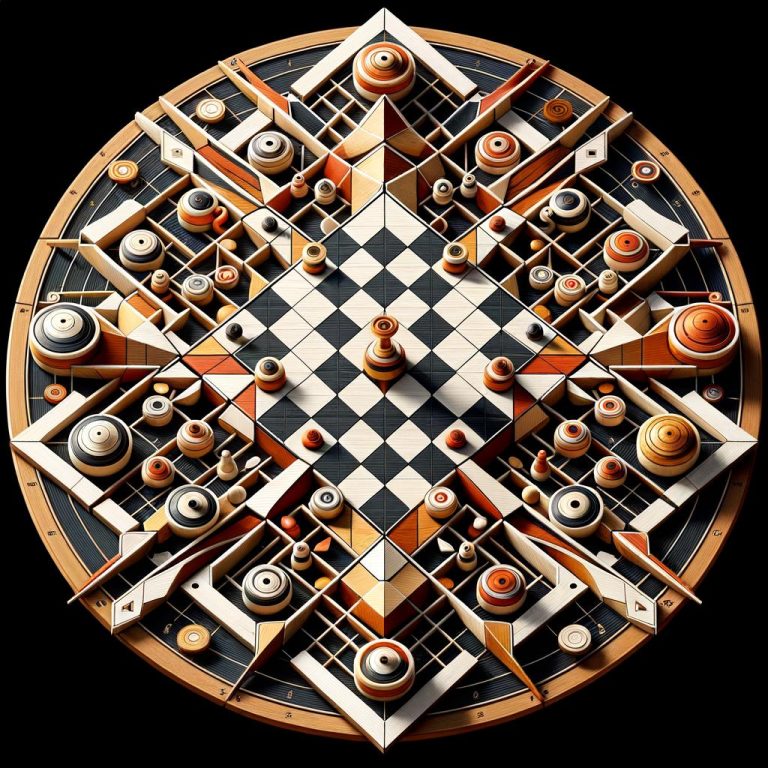Abstract strategy board games are a genre of board games that require players to make strategic decisions based on the game’s rules and objectives, rather than luck or chance. These games often involve complex decision-making, forward planning, and anticipating opponent’s moves. They have been enjoyed by enthusiasts for centuries and continue to be popular due to their challenging gameplay.
The history of abstract strategy board games can be traced back to ancient civilizations such as Egypt and Mesopotamia, where games like Senet and Mancala were played. Over the years, these games have evolved and diversified, giving rise to a wide variety of abstract strategy board games with unique themes, mechanics, and complexities. Despite the advancements in technology and gaming preferences, abstract strategy board games remain a timeless classic in the world of board gaming.
Some of the most well-known and beloved abstract strategy board games include classics like Chess, Go, and Checkers, as well as modern favorites like Carcassonne and Hive. These games have stood the test of time and are cherished by players for their depth, replayability, and competitive nature. Whether played casually with friends or at a professional level in tournaments, abstract strategy board games offer a stimulating challenge that keeps players coming back for more.
History of Abstract Strategy Board Games
Abstract strategy board games have a rich and diverse history that spans centuries, with roots dating back to ancient civilizations. These games have evolved over time, influenced by cultural traditions, technological advancements, and strategic innovations. Here are some key milestones in the history of abstract strategy board games:
- Ancient Origins: Some of the earliest known abstract strategy board games can be traced back to ancient civilizations such as Egypt, Mesopotamia, and China. Games like Senet, Mancala, and Go have stood the test of time and continue to be played today.
- Medieval Europe: Abstract strategy board games gained popularity in medieval Europe, where games like Chess and Checkers became symbolic of nobility and intellectual prowess. Chess, in particular, became a staple in royal courts and remains one of the most iconic abstract strategy board games in history.
- Modern Revival: The 20th century saw a resurgence of interest in abstract strategy board games, with designers creating innovative new titles that pushed the boundaries of gameplay and strategy. Games like Hive, Santorini, and Azul have garnered critical acclaim for their depth of tactics and elegant design.
As abstract strategy board games continue to evolve and capture the imaginations of players around the world, it is clear that they hold a special place in the pantheon of board gaming history. From ancient classics to modern masterpieces, these games offer timeless entertainment and challenge players to think critically and strategically.
Popular Abstract Strategy Board Games
Abstract strategy board games have gained immense popularity among board game enthusiasts for their focus on strategic thinking, planning, and decision-making. These games typically involve minimal luck or random elements, requiring players to rely solely on their intellect and tactical skills to outwit their opponents. As a result, they offer a unique and engaging gameplay experience that appeals to both casual and competitive gamers.
One of the most iconic abstract strategy board games is Chess, which has a rich history dating back centuries. Known for its simple yet deep mechanics, Chess challenges players to anticipate their opponent’s moves while formulating their own strategies to achieve checkmate.
Another beloved game in this genre is Go, an ancient Asian game that emphasizes territorial control and capturing stones. Go’s elegant ruleset and complex strategy have made it a favorite among players looking for a more contemplative gaming experience.
In recent years, modern abstract strategy board games such as Azul and Santorini have captured the attention of the gaming community with their innovative mechanics and stunning components. Azul tasks players with creating intricate patterns using colorful tiles, while Santorini combines simple rules with deep strategic depth as players build structures on a grid-like board. These games demonstrate the enduring appeal of abstract strategy board games in providing intellectually stimulating and rewarding gameplay experiences for players of all levels.
| Abstract Strategy Board Game | Description |
|---|---|
| Chess | An iconic game dating back centuries known for its deep strategic mechanics. |
| Go | An ancient Asian game emphasizing territorial control and stone capture. |
| Azul | A modern game focused on creating patterns with colorful tiles. |
How to Play an Abstract Strategy Board Game
Abstract strategy board games are a genre of tabletop games that emphasize strategic thinking, planning, and decision-making over luck or random chance. These games typically involve two players competing against each other in a battle of wits to outmaneuver and outsmart their opponent. The use of abstract concepts, such as geometric shapes, patterns, or colors, distinguishes these games from traditional board games with themes or narrative elements.
One crucial aspect of playing an abstract strategy board game is understanding the basic rules and objectives of the game. Before diving into gameplay, it is essential to familiarize yourself with the setup of the game board, the starting positions of pieces (if applicable), and any special rules or conditions that may apply during gameplay. Each game will have its unique set of rules and victory conditions that players must adhere to in order to succeed.
In addition to learning the rules, developing effective strategies is key to mastering an abstract strategy board game. Players must anticipate their opponent’s moves while also planning their own actions strategically to achieve their goals.
This involves analyzing patterns on the board, predicting outcomes of different moves, and adapting one’s strategy based on new developments during gameplay. By honing these skills through practice and experience, players can improve their gameplay and increase their chances of success in abstract strategy board games.
| Aspect | Description |
|---|---|
| Objective | Understanding the basic rules and objectives of the game |
| Strategy | Developing effective strategies to outmaneuver opponents |
| Analytical Thinking | Analyzing patterns on the board and predicting outcomes |
Benefits of Playing Abstract Strategy Board Games
Abstract strategy board games are not only entertaining but also offer a plethora of cognitive benefits and opportunities to develop various skills. These games require players to think critically, plan ahead, analyze situations, and adapt strategies based on their opponents’ moves. By regularly engaging in abstract strategy board games, players can enhance their problem-solving abilities, decision-making skills, and spatial awareness.
Enhanced Cognitive Skills
One of the key benefits of playing abstract strategy board games is the improvement of cognitive skills. These games challenge players to think strategically, anticipate their opponent’s next move, and make calculated decisions. As players navigate through the game’s complexities and constraints, they exercise their analytical thinking, logical reasoning, and pattern recognition skills. The constant need to assess multiple possibilities and outcomes in real-time also enhances focus and concentration.
Strategic Thinking
Abstract strategy board games require players to formulate long-term plans while considering short-term goals and tactics. By honing their strategic thinking skills in these games, players learn how to prioritize objectives, allocate resources effectively, and adapt their strategies based on changing circumstances. This ability to think strategically can be transferable to various aspects of life, such as problem-solving in professional environments or making informed decisions in daily tasks.
Social Skills Development
In addition to cognitive benefits, playing abstract strategy board games can also foster the development of social skills. These games often involve interaction with other players, communication through gameplay actions or discussions about strategies. By engaging in friendly competition and cooperative play in abstract strategy board games, individuals can improve social dynamics like sportsmanship, teamwork coordination, and conflict resolution. The shared experience of playing these games can also create bonds between players and strengthen relationships over time.
Abstract Strategy Board Games vs Traditional Board Games
Abstract strategy board games offer a unique gaming experience that is distinct from traditional board games. Here are some key differences between abstract strategy board games and traditional board games:
- Gameplay: Abstract strategy board games typically involve minimal luck or randomness, focusing more on strategic decision-making and critical thinking. Players must outmaneuver their opponents using skill, tactics, and foresight rather than relying on dice rolls or card draws.
- Mechanics: Abstract strategy board games often have simple rules and mechanics, making them easy to learn but difficult to master. These games usually have a clear set of objectives for players to achieve, such as capturing the opponent’s pieces or controlling certain areas of the board.
- Objectives: The primary goal in abstract strategy board games is usually to outthink and outplay your opponent in a battle of wits. Winning these games requires careful planning, adaptability, and foresight, as players must anticipate their opponent’s moves and counter them effectively.
In contrast, traditional board games may rely more on luck, player interaction, theme, or storytelling to drive gameplay. Games like Monopoly or Risk often involve elements of chance and negotiation in addition to strategic decision-making. While both types of board games can be enjoyable and engaging in their own right, abstract strategy board games provide a pure test of skill and mental acuity.
Whether you prefer the unpredictability of traditional board games or the strategic depth of abstract strategy board games, there is no denying the appeal and challenge that each genre offers. Players looking for a cerebral challenge and a chance to showcase their tactical prowess may find themselves drawn to the world of abstract strategy board games. So why not give one a try and see if you have what it takes to emerge victorious in this battle of minds?
Interviews With Abstract Strategy Board Game Designers
Meet the Designers
Several designers have made a significant impact on the world of abstract strategy board games with their innovative creations. One such designer is Reiner Knizia, known for iconic games like Tigris & Euphrates and Samurai. Knizia’s approach to game design often involves deep strategic thinking and elegant mechanics that challenge players in new ways. Another noteworthy designer is Kris Burm, the mind behind the GIPF project, a series of interconnected abstract strategy games that emphasize spatial reasoning and tactical planning.
Creative Process
Each designer has a unique creative process when it comes to developing abstract strategy board games. Some draw inspiration from mathematical concepts or classic game mechanics, while others find ideas in everyday experiences or artistic movements. For example, a designer might start with a simple mechanic or theme and gradually build upon it through playtesting and iteration. The goal is to create a game that is engaging, balanced, and offers depth for players to explore different strategies.
Inspirations and Influences
Abstract strategy board game designers often draw inspiration from various sources, including other games, art, literature, and even nature. Some designers are influenced by historical conflicts or cultural themes, while others aim to evoke emotions or provoke thought through their game designs. By studying different influences and exploring diverse perspectives, designers are able to bring fresh ideas and innovation to the world of abstract strategy board games.
Tips for Improving Your Skills in Abstract Strategy Board Games
In conclusion, abstract strategy board games offer a unique and engaging challenge that can captivate players of all ages. These games are not just about luck or chance, but require careful planning, critical thinking, and strategic decision-making. By regularly playing abstract strategy board games, players can enhance their cognitive skills such as problem-solving, spatial awareness, and forward thinking.
To improve your skills in abstract strategy board games, it is essential to practice regularly and familiarize yourself with the rules and mechanics of the game. Understanding the fundamental strategies and tactics used in these games can also give you a competitive edge during gameplay. Additionally, analyzing your past games, learning from your mistakes, and adapting your strategies can help you grow as a player and expand your strategic thinking abilities.
Furthermore, seeking out online resources, tutorials, or joining local gaming communities can provide valuable insights and tips on how to excel in abstract strategy board games. Engaging with other players, discussing strategies, and learning from their experiences can deepen your understanding of the game and improve your overall gameplay. Remember that mastering an abstract strategy board game takes time and patience, so enjoy the journey of learning and improving your skills in this intellectually stimulating genre of board gaming.
Frequently Asked Questions
What Is an Abstract Strategy Board Game?
An abstract strategy board game is a game that focuses on strategic decision-making and critical thinking rather than luck or theme. In these games, players usually have perfect information about the game state and take turns making moves based on that information.
What Is the Most Famous Strategy Board Game?
The most famous strategy board game is likely chess. Dating back centuries, chess has a rich history and is played worldwide by millions of people. It requires deep strategic thinking, tactical skills, and foresight to outsmart your opponent.
Is Go an Abstract Strategy Game?
Yes, Go is an abstract strategy game. Also known as Baduk, Wei Chi, or Igo, Go is a two-player game that originated in ancient China. It involves placing stones on a grid to control territory while strategically limiting your opponent’s movements. Its simplicity masks the depth of complexity and strategic possibilities involved in playing the game.

I love playing all kinds of games – from classics like Monopoly to modern favourites like Ticket to Ride.
I created this blog as a way to share my love of board games with others, and provide information on the latest releases and news in the industry.





